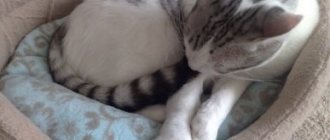Cats are not as open animals as dogs, and when menstruation comes into the house, they are not happy about it, but tend to hide in a dark corner. The reason for this behavior is that meowing pets are introverts by nature. Although some owners who have no experience with cats do not know about this prefix. They believe that the animal is sick, which is why it is hiding.
In this article, wrap it up, an analysis of this cat habit is given, and advice is given on how to get the cat to get rid of it.
Signs that the cat is ill
Although cat psychologists assure everyone around them, what is it? a cat hides in a secluded corner only because of its character, but it’s worth considering such an unpleasant factor as the onset of various pathologies in the cat’s body. You should be especially careful, otherwise) such behavior has not been noticed in the cat before, and at the behest of the pike) such a habit has arisen.
If a cat suddenly, for no apparent reason, begins to hide under a table, a closet, or in dark corners, you need to carefully monitor your pet and see if he shows the following symptoms of ill health:
- The animal refuses food for a long time and does not eat.
- The foster child constantly drinks water. Or vice versa - he doesn’t touch her.
- The puma sleeps all the time. Day and night.
- The pet has constant diarrhea.
- The cat is throwing up and vomiting.
- The fur on the pet's body is severely damaged - the color has lost, it is unkempt and bunched up in lumps, and falls out.
All these signs in the world, combined with the fact that the cat is hiding in some corners, indicate that the animal needs to be urgently caught and taken to the veterinarian for a thorough examination.
Contacting a veterinarian
It must be remembered that the best treatment is prevention. A preventive visit to a veterinarian will help identify diseases in the early stages and begin treatment immediately. Your cat also needs to be vaccinated once a year. If desired, you can combine vaccination and a preventive appointment with a veterinarian.
If the following symptoms appear, a visit to the doctor is mandatory.
Lack of appetite
If the cat does not eat, does not want to drink and refuses its favorite treats, and sleeps all the time in a secluded place, a trip to the clinic cannot be postponed. Fasting is strictly contraindicated for cats, since prolonged refusal to eat leads to disruption of liver function.
Lethargy
Lethargy, apathy and drowsiness may indicate severe intoxication or high fever. It is necessary to figure out what could cause this condition. A visit to a veterinarian in such cases is mandatory.
Loss of coordination
If your cat begins to fall over on its side when walking, has difficulty moving its paws, or crashes into walls, a visit to the veterinarian is necessary. Loss of coordination is an alarming symptom and can indicate both vision loss and brain dysfunction.
Another symptom of a concussion or stroke is different pupils
Other
Along with the desire to hide, a cat may have the following symptoms:
- refusal to eat;
- diarrhea;
- vomit;
- apathy, lethargy;
- dull coat;
- urine mixed with blood or no urine;
- discharge from the eyes and nose;
- bad breath;
- a strong change in behavior - aggression in a usually kind cat or sudden sympathy in an aggressive animal. If a cat suddenly begins to lick and caress, this should alert you;
- profuse salivation.
Important! If any of these symptoms appear, you should immediately contact a veterinary clinic!
Cats are very mysterious animals. Why do they like to hide in boxes, climb into dark corners and jump around the apartment at night? Only the cat god knows. But sometimes a game of hide and seek can be harmless, and sometimes it’s better to play it safe and take your pet to the vet. This specialist will tell you in detail what behavior of your pet should be alarming and what is considered normal. Do not forget that prevention is always easier and cheaper than treatment.
Owners sometimes notice that their cat hides in dark places or begins to look for cover. This phenomenon can be either periodic when a stranger appears in the apartment, or constant. If your pet demonstrates this behavior for no particular reason, then you should observe it. Then it will definitely be revealed why the animal “plays hide and seek.”
It's not the blanket, it's the owner!
However, most often a visit under the blanket is simply the pet’s desire to thank you for your love. When a cat cuddles, purrs, and tramples its owner with its paws, it thus expresses the highest degree of gratitude for the kindness that a person does for it, and a blanket is simply a pleasant decoration for expressing tender feelings.
If you don't want your cat to come into your bed or sleep under your blanket, gently let her know this. Do not scold an animal that is hiding in the warmth.
Take your pet in your arms, take it to another room, caress it and treat it to something tasty. Make another place in the house a permanent spot for spending quality time together. Also, give your cat her own warm blanket that she can hide under if she wants.
Svetlana Mosolova
We're just playing!
Cats are known to be very mischievous! These pets never get bored and always find something to do. And the favorite pastime of these indoor predators is unexpected attacks from ambush, which is perfect for the hidden spaces under the bed or behind the closet! Kittens and young pets are especially happy with such games.
Attention! You should not scold your pet if he accidentally scratches you during such a “hunt”. The cat simply will not understand how he offended you, and may be very upset.
Psychological discomfort
The main factors associated with ill health have been discussed, and now we can move on to other, everyday reasons why cats hide in the dark.
Cats have a very strong nervous system and any unusual event that goes beyond their usual way of life is overstrain for them. The pet is overwhelmed by experiences that make it nervous and suffer damage, and it tries to hide in a dark place. What can be the source of suffering?
- Apartment renovation, change of residence and relocation, long pilgrimage.
- Often a cat begins to hide after a visit to the veterinary clinic, and the animal loses credit with its owner.
- In the house, which the cat rightly considers its territory, other animals, children, or paints visit the owners at the same time.
- Quite often, cats run away into dark corners because of a bad attitude towards them from one of the family members.
- It happens that a cat ran away from the house, but it was caught and returned back. She is trying to figure out what happened, to recover from the stress that befell her. For this purpose, she needs privacy and so that no one disturbs her, because the mustachioed fugitive will hide behind a chair or cabinet and will be able to slowly realize what has happened. Owners are advised not to touch it and leave it alone.
The owner should clearly know that a cat that is in a prolonged state of stress can simply get sick. Stressful situations that fall on top of the cat's weak shoulders weaken the immune system, causing problems with the stomach, intestines and heart. Therefore, it is advisable to quickly do everything possible so that the pet does not experience more nervous shock.
Stressful moment
Not all pets cope well with stressful situations. Some events can cause panic attacks and a desire to hide:
- moving;
- going to the vet;
- first outing for a walk;
- meeting unfamiliar people or animals;
- taking medications.
It is worth leaving the cat in its shelter for a while. Very soon the pet will calm down and leave the dark place.
The cat is stressed. Cats, like all living beings, are susceptible to stress. Most often, the causes of animal stress are fear of something, or a sudden change in environment. If a person can somehow understand and analyze the situation, then cats perceive reality as it is.
We suggest you read: How to treat conjunctivitis in a cat - Treatment of arthrosis and arthritis, treatment of gout
The owner may not always understand that the cat is stressed and what reasons led it to this state. But in any case, if the animal’s behavior has changed dramatically, then this should alert you.
If this condition lasts too long, then the treatment will be very difficult, and may even be useless, since stress has a negative effect on the entire body.
- The cat began to lick itself too often and actively. One of our cats, for no apparent reason, began to lick its belly often. It got to the point where he was covered all over with bloody sores. We still don’t understand what brought him to this state. But it was clear that this was stress.
I had to go to the vet. We didn’t risk taking him to the clinic in winter. In addition, he never went outside, and this could lead to even greater stress. They called a doctor to the house. They prescribed him Stop Stress drops. After a few days, the wounds began to heal.
Now we keep this medicine in our medicine cabinet all the time.
- The cat stopped washing and grooming itself. This also indicates psychological problems.
- The cat hides in dark places all the time and does not come out even for food. This condition indicates problems, either physiological or mental. You should not force the cat out of its shelter, but you should definitely contact a veterinarian. Often a cat hides from severe pain.
- The cat has become aggressive, the pupils are dilated, the ears are pressed to the head, hissing, spitting and scratching. These are clear signs of severe fear.
For example, a cat fell out of a window and nothing happened to it, but before that it had never gone outside. A sudden change of situation and fear leads to the cat rushing about, throwing itself at the walls, not recognizing its owners, and screaming wildly.
The main thing here is to quickly catch her and take her to her usual home environment. Try to calm her down with kind words and gentle stroking. Give her a few drops of valerian diluted in water and then leave her alone.
Let her walk around the apartment herself, sniff everything, and understand that this is her home.
- If your cat refuses to eat or, on the contrary, begins to endlessly touch the bowl of food, then this should also alert you.
A person in a stressed state either does not eat anything, or eats to capacity and falls asleep. This is a protective reaction of the body.
- The animal begins to eat paper or something else that is not typical for it.
- The animal has stopped going to its litter box and is trying to shit in the most unexpected places. Do not rush to punish the cat, much less scold it. By this she tells you that something does not suit her or torments her. She can’t speak, so she’s trying to draw your attention to her problems. She may have serious health problems.
- The cat began to scratch intensively and damage the furniture. The reasons are the same as described above.
The causes of a cat's stress can be various:
- Moving to a new place of residence;
- Change of owner;
- Rearranging furniture in the apartment;
- Changing the toilet;
- The birth of a child in a family;
- The appearance of new people in the apartment;
- Apartment renovation;
- Loud and incomprehensible sounds for the cat;
- The appearance of a new animal;
- Lack of attention from the owner;
- A trip to the vet;
- Severe fear;
- Falling from height;
- Going outside if the cat has never been there;
- Lost favorite toys;
- Changing your favorite house or bed;
- Punishing a cat;
- Change of food;
- Bathing;
- Various phobias;
- Etc.
There may be many reasons, but the result is the same - the cat becomes lethargic, or vice versa, aggressive. Perhaps this list will help you better understand your cat and avoid many problems.
Before treating stress, it is necessary to exclude all other diseases. But if you know for sure that the cat’s behavior has changed after a fright, then pet the animal, give it valerian, and get a good night’s sleep.
In other cases, I use Stop-Stress drops or tablets.
Cats are very sensitive to vibration. They can feel the tremors of an earthquake 10 - 15 minutes earlier than people.
Unlike dogs, cats have changed little during the domestication process.
Endorphins
Endorphins, hormones of joy and pleasure, are produced in pets when moving their paws. Thanks to this technique, cats can fight stress, improve their mood, or even cope with pain.
Misconception
One theory is that the cat uses its stomping to heal its owner. But don’t rush to rejoice if she started doing “massage” on the problem area - it’s not about her sensitivity to your diseases. Of course, cats help relieve tension and spasms. However, they trample not where it hurts, but where it is convenient for them.
Interesting fact
Perhaps you have felt that when your pet gives you a “massage” and accompanies it with a gentle purr, you relax and calm down, and nervous tension gradually fades away. In the UK, they noticed this fact long ago and now provide the opportunity to chat with a furry friend for a fee. This service consists of bringing a kind, loving cat to the client, which does its “job”: tramples its paws, purrs gently, enthusiastically accepts stroking, thereby plunging the person into a state of calm and lifting his spirits. It really helps combat stress in a busy lifestyle.
Helpful advice
Fingering with paws may not always please the owners. This may be due to the fact that some pets trample in the neck and chest area, releasing their claws and sometimes scratching the skin. In this case, you should not scold the cat, because in this way she can show her love for you. It’s better to put her on the sofa or any other place where she can happily continue her trampling and will not cause you any harm. And so that such a “massage” brings pleasure to you, take care to trim your pet’s claws in a timely manner.
Whatever the reason behind the cat “massage”, you should not drive your furry friend away - this can cause you to lose trust. It’s better to respond with tenderness, stroke his back or scratch his chin, and the pet will be grateful to you.
Pregnancy
Any cat owner will tell you that pregnant cats sometimes behave very strangely and fragmentarily from a human point of view. During pregnancy, the animal's instincts, which are rooted in the centuries-old history of evolution, become more acute.
The expectant mother begins to take care of children long before they are born. This is expressed in the fact that the cat explores the house in search of a secluded corner, where no one will touch or disturb it. As a rule, such a nook turns out to be a clothes closet, where the bag makes a nest among the household’s clean things.
The owner must take care of the pet rushing around the house in search of shelter and erect a similar nest for the animal. The best option would be an ordinary TV checker box, with some warm material placed at the bottom that absorbs moisture. Then the owner will not have to scour the house, looking for a hard-to-reach corner with helpless newborn kittens.
Pregnant cats can remain affectionate and flexible, still easily communicating with their owners, although most often these ladies are irritable and show aggression for any reason, meowing and hissing at their pets. Therefore, without memory, it is useful to save pets from annoying children’s attention, pestering and all sorts of sharp sounds, after all, the animal is already constantly tense and on the verge of exhaustion.
On the pillow
As a rule, the softest place, on the pad, is chosen by small and very tiny dogs. First of all, this is because it is softest there and the dog, due to its small parameters, fits. Plus, you put your face on the pillow, and the dog in this position is in the closest emotional proximity with you. If your pet chooses this particular place, it means that he loves you endlessly and is attached to you more than anything in the world.
The star of the series “Sultan of My Heart” spoke about the choice of his future wife
A broken nail is no problem: tips for treating nails at home
When toothpaste is harmful to children: permissible age doses
Special situations
Sometimes it happens that a cat is afraid of everything and hides. What to do if your pet is acting strange? You may have encountered some very normal situations for an animal's particular condition.
Pregnant cats hide in dark places when looking for suitable shelter to give birth. Owners are strongly encouraged to set up a box with towels in a quiet place where the expectant mother will be comfortable.
Quite often, old animals with deteriorating vision, smell and hearing feel constantly unprotected. That's why they try to hide. Try to calm your cat down by talking to it.
When to be wary
If a cat begins to hide in dark, cool places, then this is an alarming and not a very good sign. It is possible that in this way she is trying to get rid of high body temperature.
The increase in temperature is a consequence:
- scared, scared
- physical activity,
- hot weather,
- poisoning,
- acute pain.
This condition quickly normalizes. But if the temperature rises sharply by several degrees and does not subside for a long time, then this is a sign of the development of pathology. In this case, the animal must be urgently shown to the veterinarian.
How to understand that a cat is not feeling well. At these moments, her behavior changes sharply, she stops eating, sleeps a lot, does not want to use the litter box, meows pitifully, hides in a dark place - this signals the onset of the disease. Other symptoms may include diarrhea, vomiting, mucus from the nose and eyes, and hair loss. When an animal tries to perch on a tile or cold floor, such behavior indicates its poor condition. Most likely, the pet needs medical attention.
As cats age, they increasingly desire privacy; they are irritated by noise and bright lights, so they take refuge in dark places. Old animals may partially lose hearing, vision, sense of smell, or become ill.
Many furry pets love to climb into bags and boxes; some manage to lie down in a vase or pan. This should not cause concern to the owner. You just need to be careful not to move the chair or chair abruptly, as the animal may sit under it and get hurt. Before turning on the stove or washing machine, first look inside to see if there is a fluffy ball there. Try not to let the cat's fun with hide and seek turn into a tragedy. Complete mutual understanding will be the key to a pleasant life together.
Spectacle
For those who are just beginning to experience the delights of living in the same house with a cat, it is useful to know and remember that their tailed and mustachioed friend is a predator who loves to ambush other animals in natural conditions. Therefore, if you find a cat sitting in a dark corner, it makes sense to think that maybe he is just lying in wait for his next “victim.” And it doesn’t matter that she happens to be a family member passing by.
In such cases, at least you can do everything to prevent the animal from setting up an ambush in places where it is dangerous for it to be. Let's say, in ovens, washing machines or dishwashers, that it is in the order of things to pay a little attention to cabinets and bedside tables with closing doors - (unexpectedly, did you get in there? Otherwise, you won’t be able to get out, and even where, if the owners are at home and save the hunter from captivity.
Difficult to retrain
Pets sooner or later develop habits and sometimes it is very difficult to retrain them. This is especially true for cats; they adapt very poorly to external changes. If you suddenly decide that you no longer want to sleep with your pet, then the animal's behavior is unpredictable. The cat may scratch the furniture and start marking its territory.
Veterinarians advise first to please the cat with something new, to switch its attention. For example, a new toy or a special tree on which the animal can play will do.
When the furry one is busy doing something interesting, he will not want to go to war with you.
Seclusion due to illness
Sick and wounded animals instinctively hide, because they are unable to actively resist and withstand danger. Domestic cats who feel depressed do the same thing, shutting themselves off from the world and immersing themselves in their pain. They may avoid human company, but go to the hospital under a blanket, especially with chills and elevated body temperature.
Refusal of food, lethargy and reluctance to leave the shelter should alert the owner, since the stronger the disease, the weaker and more apathetic the animal becomes.
Ambush hunting
Representatives of the cat family are not physiologically adapted to long, exhausting running and prolonged pursuit of prey, preferring hiding to catching up. Even the legendary cheetah sprinter sneaks as close to its prey as possible for a short, quick lunge.
Ambush hunting is common to all cats, and a domestic cat may suddenly imagine itself as a lion, jumping out from under the blanket after some moving object. Young active animals are especially prone to hunting games, loving to arrange a safari on a vacuum cleaner brush or the ankles of the mistress.
Sometimes cats can hide food in secret places, stocking up for a “rainy day,” so finding a dried piece of raw meat in their bed is a common occurrence for a cat owner.
Decrepit age
Being young and active, the cat hides in dark places because it is possible to suddenly jump out of them and take someone passing by by surprise. And with old animals everything is more clear than with young ones. Having reached old age and become decrepit, the fosterling loses visual acuity, his sense of smell becomes worse, he becomes uninterested in active moving sights and an abundance of sounds. Therefore, one should not be surprised at his desire to hook up in places as far away from the surrounding bustle as possible.
Such needs of elderly pets must be respected. An old cat needs a lot of time to fully restore its strength, therefore, in places chosen by its tailed companion to (avoid rest), it is better to try not to make noise. In addition, veterinary experts are of the opinion that the more Older cats rest, the longer they will live.
What can be done?
If the reason for hiding in dark places is not related to illness, injury or pregnancy, you can arrange special houses (preferably high ones) where the pet can climb and rest. It will be much more interesting for the cat if the bed is combined with scratching posts and toys.
Also try not to frighten your pet with loud sounds: music, hairdryer, vacuum cleaner. Remember that this is a lot of stress for the animal!
Buy or make an interesting toy for your pet! What cat wouldn't want to chase a laser pointer or a moth tied to a string? Perhaps fun games will distract him from the desire for solitude and will bring much more joy than hide and seek.
Maybe your pet lacks live communication. Talk to your pet more often, pet it and praise it. Signs of attention are the best cure for sadness and stress!
Cats love dark places, because there they can relax, play and even chat with friends. Don't chase your pet away from its favorite place under the bed!
Too loud!
Perhaps your house is too noisy: music is playing, renovations are underway, loud long conversations. Cats have very sensitive hearing. The noise puts pressure on the pet and irritates it, which is why the animal is forced to look for a quieter place. Often the cat hides in dark places in distant rooms (for example, under the bed in the bedroom or on the closet in the office).
Attention! If you notice that your pet is trying to avoid noisy company and goes dissatisfied into distant rooms, try to turn down the volume so as not to put the animal into a state of stress.
Is it possible to help a pet in any way?
Above, it is explained in sufficient detail why and how a cat looks for dark corners and hides in them. This time we will talk about how the owner can correct such a behavior. Here are a few recommendations that, if followed, will allow you to live with your shaggy friend kindly and with understanding:
- In the presence of stressful situations, the first step is to ensure that the reason that frightens the cat is eliminated from head to toe, and the purr has no desire to hide in the dark roof above his head. Plus, it’s worth giving your cat sedative drops and tablets at moments when the frightening feelings are especially strong.
- If the manufacturer notices that the cat is not just hiding aimlessly, but that it has symptoms of the disease (diarrhea, thirst or vomiting), then you need to immediately take it to a veterinary hospital.
- If your pet has such a character that at the slightest sign of danger or unrest, the devil immediately strives to hide somewhere darker, because you just need to equip him with a quiet nook, where he will feel safe when the apartment is full of strange strangers.
- Occasionally, your pet is pregnant; there is no need to guess where she will give birth. You can build a birthing nest yourself using available items. Then the finished structure must be shown to the cat, who can sniff and examine it. It is best to put it in a place where she once gave birth or came in and looked for a canopy.
In conclusion, I would like to emphasize that in the overwhelming majority of cases, there is nothing wrong with a cat’s desire to disappear into a secluded place. The owner should understand why the pet has such desires and make every effort to prevent fatal accidents from occurring. So that it does not get into, for example, the washing machine when washing clothes or does not end up locked in the closet.
And even if the cat did not have such a habit before, and the occurrence of something like this comes as a surprise to the owner, and in addition signs of illness are visible, in this case it is necessary to take the pet for examination to a doctor. This will help save the animal from the risk of serious diseases.
Correction methods
So, above it was described in detail why a cat hides in dark places at home. Now it’s worth moving on to questions about how to correct this behavior or make it less risky for the animal. In this regard, experts offer a number of effective recommendations, depending on the cause of the behavioral act:
- In case of stress disorders, it is necessary to completely eliminate the reason that makes the cat want to hide in the far corner. In addition, it is permissible to use light sedatives, presented in the form of tablets and drops, which the pet should drink at a time when stress is especially strong.
- If the cat was hiding due to any disease, and in addition the owner noticed aggravating symptoms, such as diarrhea, vomiting or severe thirst, then it is necessary to take it to a veterinary hospital.
- In cases where the need for privacy in dark places is related to the pet’s character traits, you should arrange a safe and quiet corner for him, where he will feel comfortable when strangers come into the house.
- During pregnancy, provide the expectant mother with a nest, which is quite simple to build from the most common means at hand. Then show it to the cat, let her sniff it and examine it carefully. If she didn’t like the place, then move the structure to the room where she already gave birth or where she often went in search of a safe shelter.
Finally, I would like to say that in most cases there is nothing wrong with hiding a furry friend in secluded places. The owner must treat such “oddities” of his pet with understanding and is obliged to protect him from a fatal accident, expressed in getting into the drum of a washing machine along with laundry or being locked in a closet. If the habit appeared abruptly and is accompanied by painful signs, then it is worth showing your pet to a doctor, this will protect him from the risk of dangerous pathologies.
Fear of light
Perhaps the pet is simply afraid of light. This is the norm if we are talking about a kitten or a pregnant cat.
The cubs are born completely blind. Their eyes are closed because they are not yet formed to meet the light. The pupils, which can dilate or contract, are responsible for the perception of light. The pupils of kittens that have just opened their eyes cannot adjust to the brightness of the light, so you can often notice how babies hide in dark places, and sometimes simply turn their faces away from the lighting fixtures. This phenomenon will pass when the animal grows a little.
Cats that are preparing to become mothers change their behavior: some become more sociable, others diligently avoid human society. But in one thing they are the same: when the birth approaches, they want to build a nest for themselves.
Representatives of some breeds do not do this themselves; they wait for the owner to think of making a nest for them. Usually during this period the cat behaves very restlessly, it meows loudly and leads the owner to the place where it wants to have a home. In this case, it is very important to arrange a cozy bed for the expectant mother, protected from bright light, and to monitor it, because the cat will wait for human help during childbirth.
Those cats that set up a nest on their own expect one thing from the owner: he must guess her intentions and make room for a home. Helping the animal with this is very important, because if this is not done, the furry mother in labor may well choose a shelf in your linen closet for these purposes. To prevent the animal from hiding, you can help him with arranging his home:
- Make a box with one low side and three high ones.
- Cover it with soft materials. You can use old clothes for this.
Why does a cat need to hide?
The desire to hide in a dark place for a while is quite common among domestic cats. The hunter's instinct prompts them to take a position in a secluded corner so that they can calmly observe what is happening without being noticed. In other cases, especially small kittens, they want to be in a warm, cozy “nest”, where they are comfortable and safe. Fur babies grow and sleep a lot, so they need proper rest. Constantly playing TV and other noises do not provide the opportunity to have a good rest. Truly deep sleep is only possible in darkness and complete silence.
© shutterstock
It should not be surprising that cats find secluded corners in completely different places.:
- closet,
- box,
- under the bed or sofa,
- washing machine drum,
- on the shelf,
- behind the battery,
- under the owner's blanket.
If the cat hides constantly, then you need to buy one for it in a special store or make a house yourself. Fluffy pets love such shelters. This is connected not only with psychology, but also with physiology. Cats often sleep curled up. When sleeping in a confined space, they can lean their back against the wall of the house, thus relaxing their muscles.
Main reasons for seeking shelter
There are many explanations for why a cat hides in dark places. In some cases, the shelter is not always truly dark, but simply cool or, conversely, warm. There may be several favorite places for a pet, often they are well known to the owner. It is advisable not to disturb the animal at such a moment, because sometimes he needs to be alone with himself.
Why does a cat try to be invisible, let's name common reasons:
- character trait;
- the presence of another, older cat in the house;
- the need to calm down after suffering stress;
- anticipation of the appearance of offspring;
- desire to play;
- desire for security.
Timid by nature
By nature, some cats are sociable, while others prefer loneliness. Those who belong to the second category instinctively try to be “in the shadows” more often, which guarantees safety. Such a kitten will not sleep on a wide sofa with its tummy up, with its paws spread to the sides. Also, he will not once again catch someone’s eye. You can force him to come out of hiding with gentle words, a favorite treat, or a bright, entertaining toy.
If the cat is hiding, then you should not lure it out or put pressure on it. Perhaps something alarmed her, someone scared or offended her. She will go out on her own when she considers it necessary, wants to eat or take a walk. If you do not allow the predator to avoid an unpleasant situation, then its anxiety will only intensify.
Trying to get peace and comfort, even sociable cats hide. They may find a place for themselves in the linen closet or on the cool wooden floor under the bed. It all depends on whether the pet is cold or hot.
Away from the Boss
The presence of another cat or an older cat in the house causes the younger cat to hide more often. The owner can create a maze of boxes especially for him, through which he can easily get to a bowl of food or tray. The boxes must have multiple entrances and exits so that you can escape in time, avoiding a dangerous or unwanted collision with your opponent.
What to do if your cat constantly hides in a dark place. We need to keep an eye on her. If her health is fine, her fur is shiny, and her nose is wet, then the pet’s behavior is due to other reasons.
Relief from stress
After getting into an unpleasant situation or being offended, even the most sociable cat hides in order to survive the stress and regain equanimity. Cats get used to their home and don’t really like change. If a kitten is taken to another family, the naturally cautious animal will need time to adapt. In the first days, the pet will react sensitively to any sounds or movements, and if it senses danger, it will definitely hide.
When moving to another house, the cat becomes restless. For the first time, you can place him in a small room. Gradually he will get used to it and begin to explore other rooms. You will definitely need to take his bed, bowl, and tray from the old apartment. Having familiar things around will allow your pet to calm down a little and feel more confident.
Tamed domestic cats get used to it faster than those adopted from a shelter or from the street. It is not so easy to regain the trust of an animal that has lost its former home. It will take patience, a calm atmosphere and a kind attitude.
Interesting situation
Pregnant cats begin to hide in dark places, which means kittens will be born soon. To prevent your cat from hiding and throwing your things out of your nightstands and closets in search of a suitable place to place her offspring, prepare a box with soft bedding for her. Place it in a convenient place so that the cat and babies will not be disturbed.
Let's play hide and seek or go hunting
If your kitten hides under the sofa during the day and hits its owner by the legs, then in this way he is simply playing hunter. For him, a dark place is an ambush from which he stalks his prey. Some cats won't mind running around and playing chase, hide and seek, or cat and mouse. They can realize their natural hunting instinct at home only through play.
Search for safety
According to some cats, the owner's bed is considered the safest and most reliable place. Under the blanket it is warm and cozy, there is a familiar smell, which is a guarantee of protection and peace. Not every owner can be with their pet all the time. In the morning he goes to work and returns only in the evening. A cat can crawl under the blanket for the whole day, wanting to constantly feel the presence of its owner, patiently waiting for his return and a delicious dinner.
It’s bad not only for the cats themselves, but also for the owners. The fluffy beauty senses a person’s emotional mood, so she tries to relieve her owner of poor health or stress. She climbs into her arms and lies down next to her, trying to calm her down.
Secretive cat nature
Wild cats are predominantly nocturnal predators, able to navigate well in low light and come out to hunt at dusk. In the morning, the animals return to their daytime roosts, located in hidden places, such as:
- rock cleft;
- fork of branches in dense foliage;
- tree hollow;
- earth hole;
- hole under the roots.
Pets. The activity of domestic cats is also confined to the dark time of day. The mustachioed tabbys devote daylight hours to lazy pastime, getting up only to have a snack, visit the litter box, and lick themselves.
Kittens can hide:
- in the closet among bedding and things;
- on a bookshelf;
- in a cardboard box (read more about why cats love boxes);
- in a pan, vase, empty flower pot;
- in the washing machine;
- in a laundry basket;
- under a closet, sofa or bed;
- behind the central heating radiator;
- behind the chair;
- under the blanket.
In addition to a light half-sleep with closed eyes and the “inner guard” turned on, cats have real deep sleep, which is necessary to maintain health and restore strength. However, such complete relaxation is only possible in complete safety, silence and darkness. That is why mustachioed striped creatures choose hidden dark corners for themselves.
According to research by zoologists, the animal feels comfortable when the walls of the shelter touch the body. That’s why a cat’s favorite places to sleep are never too spacious.
Anti-stress nook
Personal space is of particular importance in a stressful situation, since a wise protective instinct commands cats to sit in a secluded place until the threat has passed. A disturbed cat will dive into its house, and if there is none, into one of its favorite inaccessible corners of the apartment.
Sources of fear. A loud noise or a previously unseen object can frighten an animal. So, a real shock for a timid pet will be a major repair or installation of large household appliances. Cats also quickly get tired of overly active guests and run away to the most distant dark room. Stress can be triggered by a move, an exhibition or a visit to the veterinary clinic.
Help for kids. The need to scoot and hide in a cozy den is characteristic of cats of all ages, but the psyche of small kittens is especially sensitive, instinctively striving for something warm and soft, so similar to the fluffy side of their mother. In order for the baby to quickly adapt to the new home, it is recommended to purchase a sleeping place in one of the configurations at the pet store:
- closed soft bed;
- frame house;
- “tunnel” or “hole” with a rounded mouth;
- an envelope or sleeping bag with a flattened entrance.
It would be great if the inner surface of the “den” is lined with plush or faux fur. The walls of a warm and soft shelter muffle extraneous noise and light, allowing the kitten to sleep peacefully. To prevent your baby from feeling lonely, you can put a plush toy or bedding in the house that smells like a native nest.
Cats that require special care. In addition to kittens that have just been weaned from their mother, the following are prone to “games of hide and seek”:
- timid and nervous individuals;
- young cats in the presence of an adult and confident fellow tribesman;
- cats picked up on the street and not used to living in a house;
- animals that have been mistreated and physically harmed at the hands of humans.
Owner actions.
The owner is not recommended to forcibly disturb the peace of an animal hidden in the saving darkness - this is how the body restores psychological balance.
Unsocialized wild animals can “thaw out” only with time and gentle handling. With a long “reclusion”, you can try to lure the cat out of the “den” with the help of a toy or treat.
Hiding, provoked by the clarification of the relationship between two individuals, will resolve itself when the animals get used to each other and establish the rules of the hierarchy. To avoid provoking a fight, it is recommended to install two different trays, two houses and two food bowls in different parts of the house.
Hunting games
Wild animals. Representatives of the cat family belong to ambush predators, not adapted to long pursuit of prey, and therefore hunt from shelters. Lions lie down in front of a herd of antelopes in the grass of the savannah, a spotted jaguar is hidden by the play of light among the branches, and a domesticated murka is spread out on the asphalt, sneaking up on a pigeon.
Domestic individuals. The mustachioed striped one, which does not leave the apartment, has fun through hunting games, suddenly jumping out of its secret hiding place. Especially young, uncastrated animals and representatives of hybrid breeds obtained by infusion of real “wild blood” like to go on safaris.
Any moving object can be the object of the hunt: from a ball made of candy foil to a shaggy vacuum cleaner and the ankles of the hostess. The simulation of an attack and capture of the “victim” turns out to be quite realistic, using the entire cat’s arsenal of 30 teeth and 20 claws.
What should the owner do? To wean your pet from making unexpected attacks, it is recommended to work with it more, socializing it and teaching it to play in a “civilized” manner. An abundance of various fun activities will help to throw out the hunting ardor, and a game complex and targeted training will teach the energetic cat intricate tricks.
Some cats have a genetic tendency to hide food supplies in secluded corners because their wild ancestors did not always manage to eat regularly.










